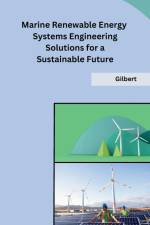av Gilbert
345,-
Overview of Marine Renewable EnergyMarine renewable energy refers to the harnessing of energy from the ocean, including waves, tides, and currents, to generate electricity. As the world seeks sustainable alternatives to fossil fuels, marine renewable energy has emerged as a promising solution, offering a vast and untapped source of clean, renewable power.This chapter provides an overview of marine renewable energy, focusing on its engineering solutions and their relevance to the field of geological engineering. Geological engineers play a crucial role in assessing the geological characteristics of potential marine energy sites, ensuring their stability and viability for energy extraction.One of the key forms of marine renewable energy is wave energy, which involves capturing the energy generated by ocean waves. Engineers have developed various technologies to harness this power, including wave energy converters that convert the kinetic energy of waves into electricity. These converters can be deployed near coastlines or offshore, making wave energy a versatile and abundant resource for coastal regions.Tidal energy is another important component of marine renewable energy. Tidal currents are a predictable and consistent source of energy, making them highly attractive for power generation. Engineers have designed tidal turbines to extract energy from tidal currents, similar to wind turbines but placed underwater. These turbines require in-depth geological assessments to ensure their proper installation and operation, making the expertise of geological engineers invaluable.In addition to waves and tides, marine currents also offer significant potential for energy extraction. Strong ocean currents, such as those found in narrow straits or channels, can be harnessed using underwater turbines. Geological engineers play a critical role in mapping these currents and identifying suitable locations for turbine deployment.Furthermore, this chapter delves into the challenges and opportunities associated with marine renewable energy. Engineering solutions to mitigate the potential environmental impacts of marine energy systems are discussed, including the need for comprehensive environmental impact assessments and monitoring programs.Overall, this subchapter provides a comprehensive introduction to marine renewable energy, highlighting its relevance to geological engineering. By leveraging the engineering expertise of geological engineers, the sustainable development of marine renewable energy systems can be achieved, paving the way for a cleaner and more sustainable future.





















